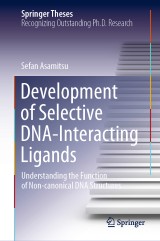Details

Development of Selective DNA-Interacting Ligands
Understanding the Function of Non-canonical DNA StructuresSpringer Theses
|
96,29 € |
|
| Verlag: | Springer |
| Format: | |
| Veröffentl.: | 16.09.2020 |
| ISBN/EAN: | 9789811577161 |
| Sprache: | englisch |
Dieses eBook enthält ein Wasserzeichen.
Beschreibungen
<div><div>This book addresses the development of both DNA-sequence-selective and DNA-form-selective ligands, with the aim of creating potential molecular probes and therapeutic agents for non-canonical DNA structure-caused human diseases. </div><div><br></div><div>Over the past two decades, the structural diversity of DNA forms has been proven to have profound implications in various biological, neurological, and pharmacological events. In response, researchers have since made tremendous efforts to obtain highly active drugs interacting with disease-related non-canonical DNA structures. These drugs, however, have not yet been approved for clinical use. One obstacle impeding their clinical application has to do with selectivity. </div><div><br></div><div>This book focuses on secondary DNA structures formed by trinucleotide repeat sequences (“hairpin form”) or guanine-rich sequences (“G-quadruplex form”), both of which are pathological molecules for neurodegenerative diseases and/or cancer. Most importantly, it contends that a particular secondary structure of DNA in the context of the human genome can be targeted with a minimal affinity to other DNA structures by means ofcareful and rational ligand design. This approach opens an avenue to the development of highly selective drugs or diagnostic chemical tools for human diseases. Readers who want to know how synthetic ligands can be designed to selectively target a certain DNA molecule will find this book highly informative. </div></div><div><br></div>
<div>1. General Introduction.- 2. Sequence-specific DNA alkylation and transcriptional inhibition by long-chain hairpin pyrrole–imidazole polyamide–chlorambucil conjugates targeting CAG/CTG trinucleotide repeats.- 3. Ligand-Mediated G-Quadruplex Induction in a Double-Stranded DNA Context by Cyclic Imidazole/Lysine Polyamide.- 4. Simultaneous Binding of Hybrid Molecules Constructed with Dual DNA-Binding Components to a G-Quadruplex and Its Proximal Duplex.</div><div><br></div>
Sefan Asamitsu obtained his B.Sc. degree from Kyoto University in 2014. He also obtained his M.Sc. degree in 2016 and his Ph.D. degree in 2019 from the Department of Chemistry at Kyoto University in the group led by Prof. Hiroshi Sugiyama. His Ph.D. thesis focuses on the development of highly selective and bioactive DNA-interactive ligands with the aim of creating potential molecular probes and therapeutic agents.
<div><div><div>This book addresses the development of both DNA-sequence-selective and DNA-form-selective ligands, with the aim of creating potential molecular probes and therapeutic agents for non-canonical DNA structure-caused human diseases. </div><div><br></div><div>Over the past two decades, the structural diversity of DNA forms has been proven to have profound implications in various biological, neurological, and pharmacological events. In response, researchers have since made tremendous efforts to obtain highly active drugs interacting with disease-related non-canonical DNA structures. These drugs, however, have not yet been approved for clinical use. One obstacle impeding their clinical application has to do with selectivity. </div><div><br></div><div>This book focuses on secondary DNA structures formed by trinucleotide repeat sequences (“hairpin form”) or guanine-rich sequences (“G-quadruplex form”), both of which are pathological molecules for neurodegenerative diseases and/or cancer. Most importantly, it contends that a particular secondary structure of DNA in the context of the human genome can be targeted with a minimal affinity to other DNA structures by means ofcareful and rational ligand design. This approach opens an avenue to the development of highly selective drugs or diagnostic chemical tools for human diseases. Readers who want to know how synthetic ligands can be designed to selectively target a certain DNA molecule will find this book highly informative. </div></div><div><br></div></div>
Nominated as an outstanding Ph.D. thesis by Kyoto University Includes systematic and exhaustive reviews of non-canonical DNA structures Offers extensive information on the synthesis of molecules, in an easy-to-follow format
Diese Produkte könnten Sie auch interessieren:

Alzheimer's Disease: Cellular and Molecular Aspects of Amyloid beta

von: J. Robin Harris, Falk Fahrenholz

213,99 €















